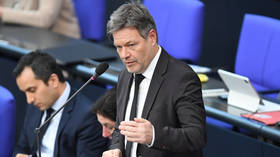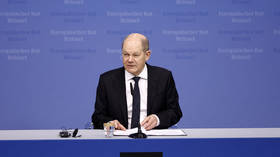German opposition party wants to emulate Russia – vice chancellor

The right-wing Alternative for Germany (AFD) party is seeking to emulate the Russian state model, the country's Vice Chancellor Robert Habeck has claimed. He urged German security services to scrutinize the political opposition more intensively.
Last month, the AFD won a mayoral election for the first time in its history, in the Saxon town of Pirna. That victory followed the party’s strongest showing on record in a western German state in October, with the AFD garnering 18.4% of the vote in the Hesse regional election. Its rivals from the ruling traffic-light coalition trailed far behind.
In an interview with Germany’s Stern magazine published on Wednesday, Habeck charged the right-wing party with aiming to attack the “essence of the republic.”
“They want to make Germany a country like Russia,” the official, who also serves as the country’s economy minister, claimed.
In light of this perceived threat, Germany’s security services should be more actively “gathering evidence [and] closely watching structures, individual persons, meetings and statements.”
Authorities should also not hesitate to go after party members who commit crimes, and to exercise toughness “along our laws and on the basis of the constitution,” Habeck added.
When asked whether he thought the AFD should be outrightly banned in Germany, the vice chancellor replied by emphasizing that such decisions fall outside the remit of politicians, as they are exclusively the prerogative of the Federal Constitutional Court.
Still, “should it be proven with certainty that a party wants to turn the country into a fascist state, it ought to be banned, regardless of how strong it is,” Habeck insisted.
He concluded by saying that the “democratic parties have to beat the AFD politically.”
While the party is considered a “suspected case” of right-wing extremism by Germany’s Office for the Protection of the Constitution (BfV) on the national level, the security service’s branch in Saxony designated the AFD as an extremist group last month.
Commenting on the decision, the local BfV chief Dirk-Martin Christian accused the AFD of pursuing an “anti-constitutional agenda.”
The legal status means that the BfV can deploy surveillance and intelligence means to gather information about the party’s activities without restriction.
In the last regional election in Saxony in 2019, the party – which critics slam as xenophobic – garnered 27.5% of the vote.
Aside from Saxony, two other German regions – Thuringia and Saxony-Anhalt – have branded the political force as an extremist entity.














